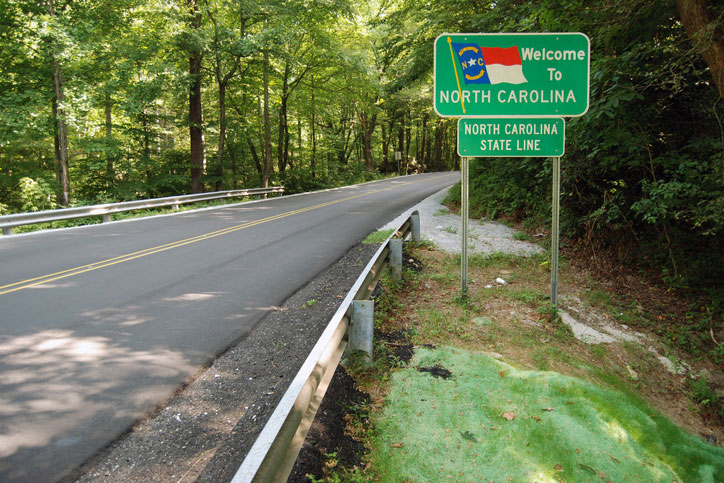Written by Helen Lewis

Charlotte, also known as the “Queen City,” is a bustling city with a population of over 900,000, making it the largest city in the state and one of the fastest-growing cities in the U.S. Known for its diverse demographics and vibrant cultural scene, Charlotte blends Southern charm with a dynamic urban atmosphere, offering a rich mix of historical and contemporary experiences.
Social work jobs in Charlotte, North Carolina, offer a diverse range of opportunities for professionals dedicated to making a difference in their communities.
When it comes to social work jobs in Charlotte, salaries can differ depending on your specialty, experience, and where you work. If you’re a clinical social worker, healthcare social worker, or in an administrative role, you’ll likely see higher salaries because of the specialized skills and qualifications these positions require.
The following post explores careers in social work in Charlotte, NC; finding an MSW program (Master’s in Social Work) and internships in Charlotte, NC; whether you need a license to practice social work in North Carolina; and the range of salaries in this part of the state.
Careers in Social Work: What Kinds of Jobs Can A Social Worker in Charlotte Do?
Social workers can pursue a variety of roles that cater to different aspects of social welfare and support services. These roles span across multiple sectors including healthcare, education, public welfare, and non-profit organizations. Each position involves distinct responsibilities, from providing direct support like therapy and counseling to advocating for policy changes and managing social programs. The diversity in job opportunities allows social workers to specialize in areas that align with their skills and passions, contributing to the well-being of individuals and communities.
Below is a non-exhaustive list of potential employment opportunities that may exist in the social work field in Charlotte, North Carolina, including:
- Clinical Social Worker
- School Social Worker
- Child and Family Social Worker
- Healthcare Social Worker
- Mental Health and Substance Abuse Social Worker
- Social Work Administrator
- Social Work Supervisor
- Gerontological Social Worker
- Community Outreach Worker
- Case Manager
- Crisis Intervention Specialist
- Adoption Specialist
- Foster Care Coordinator
- Probation Officer
- Parole Officer
- Domestic Violence Counselor
- Housing Coordinator
- Disability Services Coordinator
- Public Health Social Worker
- Medical Social Worker
- Hospice Social Worker
- Palliative Care Social Worker
- Rehabilitation Social Worker
- Veteran’s Affairs Social Worker
- Military Social Worker
- Policy Analyst
- Legislative Aide
- Advocacy Coordinator
- Non-Profit Program Manager
- Grant Writer
- Social Work Researcher
- Academic Social Worker
- Human Resources Social Worker
- Employee Assistance Program Counselor
- Juvenile Justice Social Worker
- Immigrant and Refugee Services Coordinator
- Social Work Consultant
- Community Development Worker
- Youth Services Coordinator
- Family Support Worker
- Employment Specialist
- Social Services Director
- Residential Counselor
- Shelter Manager
- Trauma-Informed Care Specialist
As you can see, social work takes many forms, and can often be interdisciplinary. That means that there are a number of entry points for prospective employees with a huge range of skills.
No matter what your skills are, social work is a field that allows workers to find their niche in a way that can be deeply meaningful. Whether you’re drawn to direct patient care, policy work, or community outreach, there’s a place for everyone. The diverse job landscape ensures that social workers can not only find a position that aligns with their passions and skills but also continue to grow and make a significant impact in their community.
Do I Need A License to Become A Social Worker in Charlotte, NC?
Requirements for licensure vary from state to state.
In North Carolina, the governing regulatory body (the North Carolina Social Work Certification and Licensure Board, or NCSWCLB) has its own requirements for obtaining a license in social work, which include the rule that clinical social workers need to have a license in order to practice. But what does that mean?
Clinical social work is a specialized field focusing on diagnosing and treating mental health issues, emotional problems, and behavioral disorders. In this context, clinical social workers are equipped to provide therapeutic services, such as individual and group therapy, and develop treatment plans to help clients manage and overcome their challenges. Clinical social workers can work in various settings, including hospitals, mental health clinics, private practices, schools, and non-profit organizations.
While a license is not required for non-clinical social work in North Carolina, a license significantly broadens your career prospects and is essential for some advanced roles. To practice as a Licensed Clinical Social Worker (LCSW) or a Licensed Master Social Worker (LMSW), you’ll need to have completed a Master’s in Social Work (MSW) from an accredited program, along with the required supervised clinical hours. These licenses are crucial for providing direct therapeutic services, conducting clinical assessments, and holding supervisory roles.
Licensure not only enhances your professional credibility but also ensures you meet the high standards of practice set by the North Carolina Social Work Certification and Licensure Board. This process involves passing the Association of Social Work Boards (ASWB) exam, which tests your knowledge and readiness for professional practice.
MSWs: Getting A Social Work Degree in Charlotte, NC

Getting a Master of Social Work (MSW) is a fantastic way to develop professional experience and expertise, which can help you create a network and better-paying jobs down the line. But do you need an MSW? The following section will explain whether or not an advanced degree in social work is necessary to enter this socially valuable, interdisciplinary field.
Charlotte, NC offers some fantastic options for MSW programs catering to the various needs and preferences of aspiring social workers. The most notable program is offered by the University of North Carolina at Charlotte (UNC Charlotte), which provides an accredited MSW program with options for both traditional and advanced standing students. This program emphasizes a comprehensive curriculum that covers areas like clinical practice, social justice, policy analysis, and research methods, ensuring that graduates are well-prepared for diverse roles in the social work field.
Another institution offering MSW programs in Charlotte is Johnson C. Smith University. This university provides both traditional and advanced standing MSW programs with a focus on advanced generalist social work practice. These programs are designed to accommodate students with different educational backgrounds and professional experiences. Both UNC Charlotte and Johnson C. Smith University offer opportunities for field placements in various settings, including hospitals, schools, and non-profits, which provide practical, hands-on experience essential for a successful career in social work.
Do I Need A Bachelor’s Degree in Social Work to Get an MSW in Charlotte, NC?
No, you don’t necessarily need a Bachelor’s Degree in Social Work (BSW) to get a Master of Social Work (MSW) in Charlotte, NC. Many MSW programs welcome students with bachelor’s degrees in other fields. These programs typically offer a “traditional” MSW track for students without a BSW, which includes foundational coursework to bring you up to speed on social work principles and practices. So, if your undergraduate degree is in a different discipline but you’re passionate about making a difference through social work, you can still pursue an MSW and embark on this rewarding career path.
However, if you do have a BSW, you might be eligible for an “advanced standing” MSW program. These programs recognize the coursework and field experience you’ve already completed during your BSW studies, allowing you to skip the foundational courses and complete your MSW in a shorter timeframe, often in just one year. This can be a great way to fast-track your education and start working in the field sooner. For more information on the specific admissions requirements at the universities you’re interested in applying to, go directly to the university’s admissions website and/or the website of the MSW program at the university you’re interested in. There, you are likely to find the information for the program you’re looking for. If you can’t find more information there, locate the email address of the admissions officer for the university, and contact them with your question directly.
Social Work Internships and Fieldwork in Charlotte
Internship and fieldwork are crucial components of MSW programs and licensure in Charlotte, NC. As part of the MSW curriculum, students must complete a specified number of hours in supervised field placements – usually somewhere between 900 and 1,000 hours, though more is also common. These placements offer hands-on experience in various social work settings, such as hospitals, schools, non-profit organizations, and government agencies.
This practical training is designed to help students apply theoretical knowledge to real-world situations, develop essential clinical and administrative skills, and understand the complexities of social work practice in diverse environments.
You might also hear the term “fieldwork” in the context of an MSW program. That refers to the practical training and supervised experience students receive as part of their academic curriculum, while an internship typically refers to a more structured and often paid work experience, which might not always be a formal requirement of an academic program.
Fieldwork is a key requirement for obtaining social work licensure in North Carolina. To become a Licensed Clinical Social Worker (LCSW) in Charlotte, graduates must first complete their MSW program, which includes the necessary fieldwork hours. After earning their degree, they must also complete additional supervised clinical experience, typically amounting to around 3,000 hours over two to three years, under the guidance of a licensed social worker. This post-graduate experience is essential for ensuring that new social workers are well-prepared for independent practice. The combination of rigorous academic training and extensive fieldwork equips MSW graduates with the competencies needed to effectively address the needs of individuals, families, and communities.
Social Worker Salaries in Charlotte
According to the Bureau of Labor Statistics, there is a wide range in salaries for social workers, with employees in this field earning anywhere from $32,730 to $97,280 annually. Healthcare social workers have the most potential for the highest earnings, with some earning as much as $80,600 annually.
The table below offers a glimpse into the range of salaries—from the bottom 10% of earners to the top 10% of earners—available to social workers in Charlotte across four categories. The final category, “Social Workers (All Other),” is broad enough that it may include such diverse positions as community organizers, homeless shelter workers, corrections social workers, grant writers, and crisis hotline counselors.
Social Work Specialty | 10% | 25% | 50% (Median) | 75% | 90% |
Child, Family, and School Social Workers | $37,470 | $44,300 | $51,550 | $61,640 | $76,460 |
Healthcare Social Workers | $47,640 | $58,220 | $63,630 | $75,590 | $80,600 |
Mental Health and Substance Abuse Social Workers | $33,810 | $41,020 | $54,100 | $61,580 | $67,620 |
Social Workers (All Other) | $41,790 | $45,970 | $52,980 | $60,990 | $68,240 |
Table data taken from 2022 BLS reports for the Charlotte-Concord-Gastonia metropolitan area.
2022 US Bureau of Labor Statistics job market trends and salary figures for child, family, and school social workers, healthcare social workers, mental health and substance abuse social workers, and social workers (all other) are based on national data, not school-specific information. Conditions in your area may vary. Data accessed June 2024.





